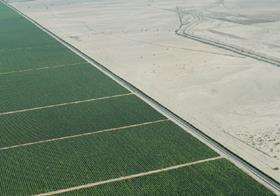
A new report quoted in the British media has suggested that demand for asparagus primarily in developed countries like the UK and the US is dwindling water resources in Peru’s Ica Valley – the epicentre of the South American country’s asparagus industry.
The research, published in a new report from development charity Progressio, claims to show how the expansion of asparagus production in the area has become unsustainable due to what it describes as a failure of regulation and corporate responsibility.
According to the report authors (Progressio, the Peruvian Centre for Rural Development (CEPES) and research and advocacy group Water Witness International), the extent of the damage is such that, 'unless action is taken, the overexploitation of the aquifer will eventually exhaust the water'.
The authors also stated that, although they do not aspire to provide answers to the water problems they see in Ica, they believed ultimately there needed to be 'a realignment of water supply and water demand in the basin'.
Through its research, the report confirmed that a set of opportunities for progress had emerged and been deliberated, developed and refined during recent stakeholder meetings in Peru.
But to drive positive change, the study said stronger incentives were required to steer water users and markets towards more sustainable modes of production.
At a national level, the report said a key requirement for making progress was a better understanding of the issues within both the social and natural sciences through data and targeted research.
Internationally, the authors strongly recommended that standards like GlobalGAP and supermarkets' own standards, as well as the IFC’s Performance Standards be reviewed and revised to ensure that they 'only reward production which exploits water resources in a genuinely sustainable way'.
On a more positive note, the report accepted that the agro-export industry had created employment in Ica for over 10,000 relatively poor Peruvians and a foreign exchange of £140m (€167.6m) a year.
As a result, it said, losing the industry could therefore have a detrimental effect on poverty rates in the region.



